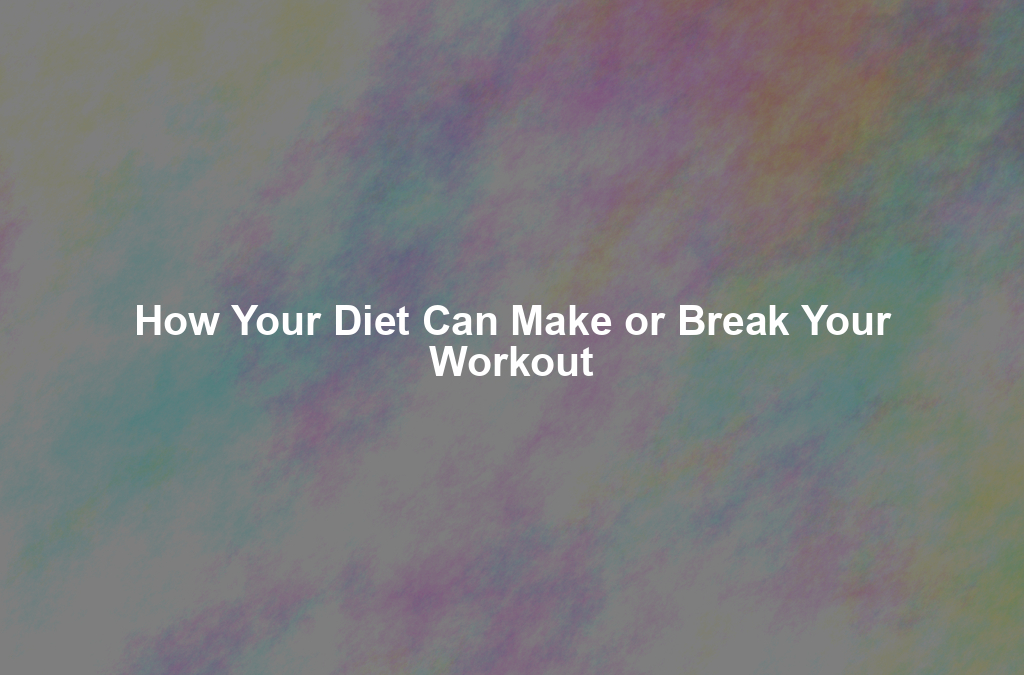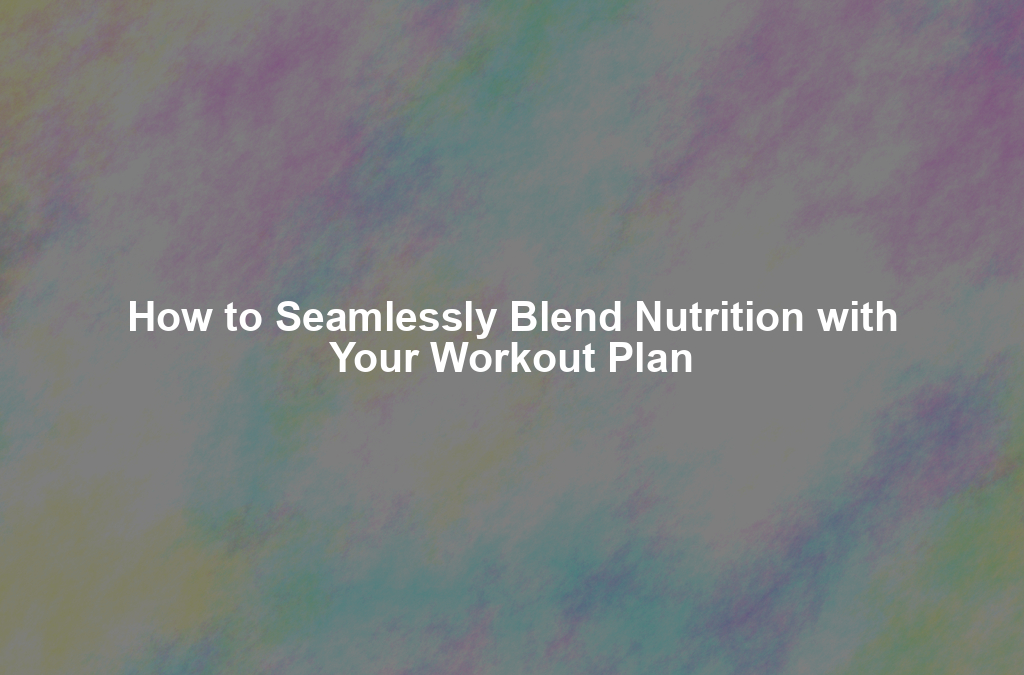
How Your Diet Can Make or Break Your Workout

A well-balanced diet plays a crucial role in fitness. Proper nutrition provides the energy needed for workouts. The Nutrition-Fitness Connection: How Diet Impacts Your Workout highlights the importance of dietary choices. Nutrients support muscle growth and repair. Carbohydrates fuel exercise sessions. Proteins aid in recovery. Fats maintain hormone levels. Poor nutrition can hinder performance. Fatigue and decreased concentration may result from inadequate carbohydrate intake. A strategic diet enhances workout outcomes. Consuming the right foods at the right times optimizes performance. Nutrition accounts for a significant portion of fitness results.
The Nutrition-Fitness Connection: How Diet Impacts Your Workout

The Nutrition-Fitness Connection: How Diet Impacts Your Workout
The Role of Macronutrients
Macronutrients form the foundation of every diet. Carbohydrates, proteins, and fats serve distinct purposes in the body. Carbohydrates provide the primary energy source for workouts. Whole grains, fruits, and vegetables offer excellent carbohydrate options. Proteins support muscle repair and growth. Lean meats, beans, and dairy products supply high-quality protein. Fats maintain hormone balance and energy reserves. Nuts, seeds, and avocados deliver healthy fats. Each macronutrient plays a vital role in the nutrition-fitness connection.
The Importance of Micronutrients
Micronutrients include vitamins and minerals. These nutrients support various bodily functions. Calcium strengthens bones. Iron transports oxygen in the blood. Vitamin C boosts the immune system. A diet rich in fruits and vegetables ensures adequate micronutrient intake. Leafy greens, citrus fruits, and nuts provide essential vitamins and minerals. Micronutrients enhance the nutrition-fitness connection by supporting overall health.
Hydration and Electrolytes
Hydration impacts workout performance. Water regulates body temperature and lubricates joints. Dehydration leads to fatigue and decreased performance. Electrolytes like sodium and potassium maintain fluid balance. Sports drinks and electrolyte tablets help replenish lost electrolytes. Proper hydration supports the nutrition-fitness connection. Drink water before, during, and after exercise for optimal results.
Timing Your Meals for Optimal Performance

Pre-Workout Nutrition
What to Eat Before Exercising
Fueling your body before a workout boosts energy levels. Choose foods rich in carbohydrates and moderate in protein. Whole grains, fruits, and yogurt provide excellent pre-workout options. Avoid high-fat and high-fiber foods to prevent digestive discomfort. A balanced pre-workout meal enhances endurance and performance.
Timing Your Pre-Workout Meal
Timing your meal impacts workout effectiveness. Consume a meal 2-3 hours before exercising. A small snack 30-60 minutes prior offers an additional energy boost. Adjust timing based on personal comfort and digestion speed. Proper meal timing ensures optimal energy availability during workouts.
Post-Workout Recovery
Importance of Post-Workout Nutrition
Post-workout nutrition aids recovery and muscle repair. Consuming nutrients after exercise replenishes glycogen stores. Protein intake supports muscle rebuilding. Carbohydrates restore energy levels. A well-planned post-workout meal accelerates recovery and enhances future performance.
Best Foods for Recovery
Choose nutrient-dense foods for post-workout recovery. Lean proteins like chicken or tofu support muscle repair. Complex carbohydrates such as brown rice or quinoa replenish energy. Include healthy fats from sources like avocados or nuts. A balanced meal within two hours of exercise maximizes recovery benefits.
Diets and Their Impact on Workouts
Popular Diets and Fitness
Keto and Low-Carb Diets
Keto and low-carb diets focus on reducing carbohydrate intake. These diets increase fat consumption to fuel the body. The body enters a state called ketosis. Ketosis burns fat for energy instead of carbohydrates. Some athletes report improved endurance with these diets. However, others experience decreased performance in high-intensity activities. Each person should monitor their body’s response. Adjustments may be necessary for optimal results.
Plant-Based Diets
Plant-based diets emphasize fruits, vegetables, grains, and legumes. These diets provide essential nutrients and fiber. Athletes following plant-based diets often report increased energy levels. Plant-based diets support cardiovascular health and reduce inflammation. Protein sources include beans, lentils, tofu, and nuts. Athletes must ensure adequate protein intake for muscle repair. A well-planned plant-based diet supports athletic performance.
Customizing Your Diet for Your Goals
Weight Loss
Diet customization helps achieve specific fitness goals. For weight loss, focus on creating a calorie deficit. Choose nutrient-dense foods that provide satiety. Incorporate lean proteins, whole grains, and plenty of vegetables. Monitor portion sizes to avoid overeating. Regular physical activity complements dietary efforts. Consistency is key to successful weight loss.
Muscle Gain
Muscle gain requires a different dietary approach. Increase protein intake to support muscle growth. Include sources like chicken, fish, eggs, and dairy. Carbohydrates provide energy for strength training. Whole grains, fruits, and vegetables should be part of every meal. Healthy fats from avocados, nuts, and seeds support hormone production. Adequate caloric intake ensures muscle-building success.
Common Dietary Mistakes to Avoid
Skipping Meals
Skipping meals can lead to low energy levels. The body needs consistent fuel for workouts. Missing meals often results in sluggishness. Poor workout performance may follow. Consistent meal intake supports energy and focus.
Effects on Energy Levels
Energy levels drop when meals are skipped. The body lacks necessary nutrients. Fatigue sets in quickly during exercise. Concentration decreases, affecting performance. Regular meals maintain steady energy.
Overeating or Undereating
Overeating or undereating disrupts balance. Both extremes impact workout effectiveness. Finding the right caloric intake is crucial. Proper balance supports fitness goals.
Balancing Caloric Intake
Balancing caloric intake requires attention. Overeating leads to weight gain. Undereating causes energy depletion. Monitoring portion sizes helps maintain balance. A balanced diet enhances workout results.
Evidence-Based Recommendations
Expert Tips for a Balanced Diet
Incorporating Superfoods
Superfoods provide a wealth of nutrients. These foods include fruits, vegetables, nuts, and seeds. Nature Jim, a nutrition expert, advises including superfoods in every meal. Superfoods contain high levels of vitamins and minerals. Focus on adding these healthy options to your diet. Blueberries, kale, and chia seeds offer excellent choices. Quinoa and almonds also serve as nutritious additions. Superfoods enhance overall health and support workout goals.
Listening to Your Body’s Needs
Your body communicates its needs through signals. Pay attention to hunger and fullness cues. Eat when you feel hungry. Stop eating when you feel satisfied. Different bodies require different amounts of food. Adjust your diet based on energy levels and performance. Notice how certain foods affect your workouts. Some foods may boost energy, while others cause sluggishness. Tailor your diet to fit your unique needs. This approach promotes optimal health and fitness outcomes.
A well-planned diet plays a vital role in workout success. Nutritional choices directly impact energy levels and performance. Carbohydrates, proteins, and fats each contribute to fitness goals. Proper hydration and meal timing enhance results. Exercise can influence dietary habits, leading to healthier choices. Combining diet and exercise optimizes health and quality of life. Make informed dietary decisions to support your fitness journey. Tailor your nutrition to fit personal needs and goals. Prioritize balanced meals for improved performance and recovery.


